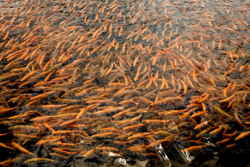Peptide-based vaccine for farmed fish
Salmon and trout are of considerable economic importance both for aquaculture and in providing sport to anglers. It has been predicted that the production of farmed Atlantic salmon and rainbow trout in Europe will expand rapidly. Furthermore, brown trout is also farmed on a large scale and the production of non-salmonid, like seabass and seabream, is set to increase. The work of PEPTIDEX also reduces the environmental impact of an outbreak by reducing the spread of disease to wild populations of fish. The study has encouraged similar studies in other farmed species and has the potential to significantly increase production. The PEPTIDEX viral pathogen epitope prediction programme promises to benefit future vaccine design by providing techniques easily transferable to a range of cultured fish. Moreover, peptide-based vaccines are safer for those administering the vaccine than conventional methods and the fish themselves experience fewer side effects. Food safety is of major concern to governments and consumers alike. Current DNA-vaccine constructs raise a number of concerns. However, peptide vaccines avoid these shortcomings by being administered in a non-replicative peptide form.







